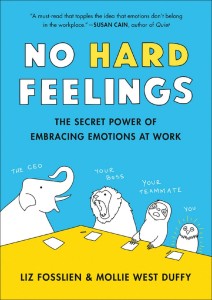Outsmart Your Next Stress Spiral With These 2 Simple Strategies
March 4, 2019
Quick question: Where are you right now?
Maybe it’s “on the way to work” or “curled up with my coffee” or “on my couch ready for a Netflix session” or “reading this while going to the bathroom” (we alllll do it).
Our follow-up question: When’s the last time you fully showed up to the now?
Harvard psychologists Matthew Killingsworth and Daniel Gilbert estimate we spend only half our time focused on the present.
Why does that matter?
We’re happiest when we live in the moment, no matter what we’re working on. In a study of more than five thousand people, Killingsworth and Gilbert found that a wandering mind is usually an unhappy mind.
We’re happiest when we live in the moment, no matter what we’re working on.
When our minds wander toward the past or the future, they often end up ruminating. Rumination differs from healthy reflection, when we analyze specific elements of a problem to better understand it.
Say you email a professor and don’t get an immediate response. Your mind might jump to thoughts like “she thinks I’m dumb” or “my essays are always bad”—that’s rumination in action.
The good news: You can learn to bring your mind back to the present, stop ruminating, and outsmart your stress. Here are two strategies that can help.
Notice the 3Ps
The first step to getting present is noticing your cognitive distortions, or the dirty tricks your brain plays to pull you out of the moment, particularly after a stressful or frustrating moment.
The first step to getting present is noticing your cognitive distortions, or the dirty tricks your brain plays to pull you out of the moment.
Psychologist Martin Seligman identified the “three Ps” we tend to focus on after a negative event:
●︎ Personalization: Thinking that the event is all your fault
●︎ Pervasiveness: Thinking that the event is going to ruin every aspect of your life
●︎ Permanence: Thinking you are going to feel like this (e.g., bad) forever
Don’t give the Ps a chance! If you find yourself pessimistically obsessing, reframe your thoughts. Here are some ideas:Personalization: Instead of immediately thinking, “I’m the reason we lost the client,” try to look at what happened more objectively. On any project, issues will come up that are beyond your control. Own up to your mistakes, but don’t needlessly blame everything on yourself.
Pervasiveness: If you realize after a meeting you had a stain on your blouse (welcome to the club), try not to become consumed with anxiety. A tiny mistake is unlikely to start a chain reaction that ends in complete disaster.
Permanence: The words “always” and “never” are usually indications your self-reflection has turned self-destructive. Say your boss isn’t happy with a one-pager you created. Instead of thinking, “I’ll never be a good designer,” focus on the single event: “This wasn’t my best work, but I can learn more skills and improve.”

Another way to stop yourself from ruminating is through social distancing, which is when you try to look at your situation through someone else’s eyes. Ask yourself, “What advice would I give to a friend who felt similarly?” This question forces you to step outside negative thinking patterns.
Lastly, remember your thoughts are simply that: thoughts. Acknowledge them, but recognize they are not inevitable truths (even if they feel true). As psychologist William James writes, “The greatest weapon against stress is our ability to choose one thought over another.”
'The greatest weapon against stress is our ability to choose one thought over another.' - William James
Separate the ‘Withins’ From the ‘Beyonds’
Our stress can pull us from the present and throw us into a rumination spiral. It's helpful to know that stressors fall into two categories: those you can do something about (the withins) and those beyond your control (the beyonds).
Stressors fall into two categories: those you can do something about (the withins) and those beyond your control (the beyonds).
When you’re not feeling present, notice which of these stressors might have you hooked.
If you’re anxious because of withins—unanswered emails in your inbox or an impending deadline—the easiest way to feel better is to complete the thing that is stressing you out. “Nothing diminishes anxiety faster than action,” notes the American painter and writer Walter Anderson.
How do you stop stressing about the things you can’t control? First, you have to be diligent about recognizing what you can’t control. If you feel responsible for the beyonds, you’ll never be able to confidently say you’ve done enough and relax.
Writing out all your “beyonds” can help you sort through them.
Psychologist Nick Wignall schedules five to fifteen minutes every day to write down all his anxieties. He then highlights everything that is (1) an actual problem, (2) urgent (it must be done in the next day or two), and (3) within his control.
Nick would not highlight a hypothetical worry like, “What if I get sick before the big client meeting next week?” He would highlight “I forgot to reply to Christine’s email.” For each highlighted problem, Nick sets a reminder to complete the next smallest step he can take (e.g., “Respond to Christine’s email tomorrow at 9:00 a.m.”).
Stress can easily throw us out of our element—and the moment. But with these simple strategies, you can start finding a way to stay in the present, regardless of what the day brings. Here’s to being here, now.

Shine is supported by members like you. When you buy through links on our site, we may earn an affiliate commission.
Adapted from No Hard Feelings: The Secret Power of Embracing Emotions at Work by Liz Fosslien and Mollie West Duffy with permission of Portfolio, an imprint of Penguin Publishing Group, a division of Penguin Random House LLC. Copyright © Liz Fosslien and Mollie West Duffy, 2019.
Read next: How 'Present-Moment Nudges' Can Boost Your Mood

Shine is supported by members like you. When you buy through links on our site, we may earn an affiliate commission. See our affiliate disclosure for more info.


